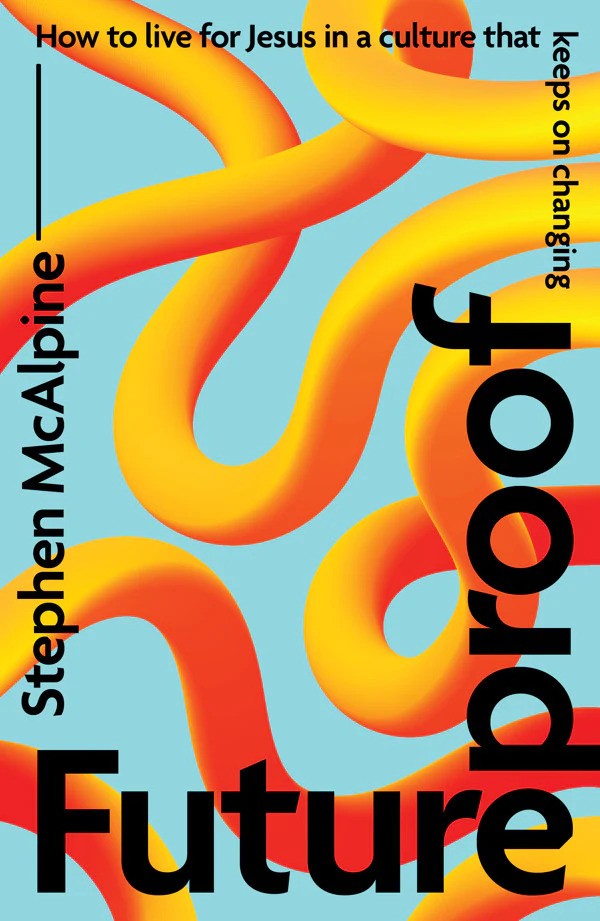Futureproof is Stephen McAlpine’s follow up to his acclaimed Being the Bad Guys which won the title of Australian Christian Book of the Year in 2021.
In that first book, MacAlpine sought to explain how the church got to the negative place in which it finds itself in the eyes of much of Western culture today—a place that many Christians are struggling to understand in light of so much that’s positive in the church and its history.
This new volume aims to dig into some of the priorities and meta-stories that are now shaping our surrounding culture, and to cautiously project forward as to what these might mean for the churches and societies of the generations ahead. It offers McAlpine’s views on what needs to be done to ‘futureproof’ the church in acceptance of its present context, and anticipation of its future. Nicely, the title does double duty as McAlpine not only calls readers to action, but regularly reminds us that the church at large is already futureproof because Jesus has absolutely secured and plainly declared its ultimate fate.

Futureproof
Steve McAlpine
Stephen McAlpine’s first book, Being the Bad Guys, sought to explain how our culture ended up so far away from biblical Christianity and how to reach out with the gospel wisely. In this book, he explores where things are heading and what we can do about that now, both as individuals and as a church.
Stephen examines secular narratives about purpose and authenticity, connectedness and progress, and compares them to the promises made by the Bible. He shows that the Bible offers a more satisfying, more realistic and more hopeful vision of the future.
Outperforming Western Culture
Futureproof is divided into two parts.
In the first McAlpine talks about how to outperform Western culture in the things it values most. With regard to purpose, the church is shown to offer something better than the full actualisation of individual autonomy that is considered so fundamental to so many today. On relationships, the church is presented as a haven in comparison to the breakdown and shrivelling up of so many other social institutions leading to widespread loneliness epidemics. And turning to endurance, the church’s stability is highlighted in the face of a culture that is changing so fast that it cannot keep up with itself and cannot offer much solid ground to anyone. In all of this, a real highlight for me is the pervasive emphasis that McAlpine places on the church rather than on individual Christian believers. There is a strong underscoring of the fact that the way which God meets the deepest needs of all people is through his people as a collective, as a corporate body. Excellent.
There is a strong underscoring of the fact that the way which God meets the deepest needs of all people is through his people as a collective.
In its second part, Futureproof turns its attention to the high-profile particular issues that trouble the world today and so are dominating public attention and the current discourse. And again, the big point here is that what the Christian faith offers is better than any other solutions. So, social polarisation is met by self-control and, once more, by the gathered communities of the church. The risks inherent in digital technology and online life are met by ‘digital’—here meaning immersive—discipleship. The culture wars are met by the call to live as dual citizens with real commitment to the spiritual as well as the temporal realms, even as the latter might reject us. And finally, grave concerns about the state and trajectory of the environment are met, of course, by New Creation hope.
Penetrating Analysis
There is much to be commend and to be grateful for in these pages. McAlpine writes clearly and crisply in a very accessible style. The book is not at all hard to read. Yet, his analysis is penetrating, getting right to the heart of the big issues. On top of this, he is balanced too. For me, this is most welcome as there is no place where the book takes long digressions down side-tracks or where derivative matters are given more attention than their underlying causes. The perspective that comes from setting the minor points in the context of the major is a something I especially appreciate. Moreover, the theological framing throughout is robust and reliable, and there is good use of the Bible, including some in-depth exploration of several key passages. And finally, perhaps most significantly to me, I found that as I read through, I agreed with most all of the content, claims, and conclusions. I really bought what McAlpine is saying throughout Futureproof. Couple together the style and the content and I repeatedly found myself saying, ‘That’s exactly right’, ‘That’s so helpfully spelled out’, ‘That’s just the way to say it.’ In many ways Futureproof is a great articulation of things that I believe deeply and about which I feel strongly.
There is no place where the book takes long digressions down side-tracks or where derivative matters are given more attention than their underlying causes.
The flip-side of all this is that, as good as it is, I’m not sure that I really learned anything new from Futureproof. There were no big ‘ah ha’ moments for me, and no especially fresh challenges. Now, this might be because part of my job is to think about the way the church is shaped and the ways in which it does, and should, interact with the world around. However, I think this is also the job of anyone in ministry leadership and so—as much as I am on board with most everything in the book—I do wonder how much value it offers for those who are already thinking these thoughts and who have been for years. Of course, McAlpine is not writing for just the ‘professional’ class of Christians. This is a book for all believers living in today’s West and I think it should find a great audience throughout the wider church. It could even be that Futureproof is an excellent resource for a church reading group, a lay leadership development program, or an eldership retreat. Certainly, it will be easy to recommend to anyone who wants some good written Christian input on how to chart a course of faithful living in this generation and maybe also the next.
Short, sharp, accessible, on point, and, for me, hard to fault in terms of its content. Futureproof offers a great analysis of our age and a good framework for living in it to the greater glory of Jesus.















